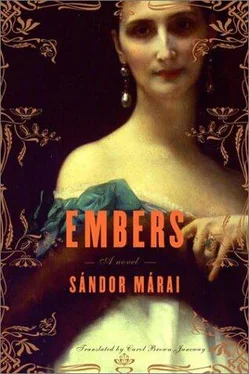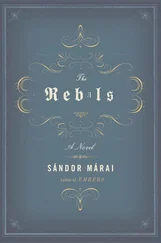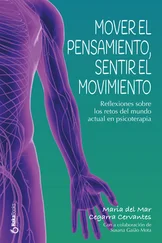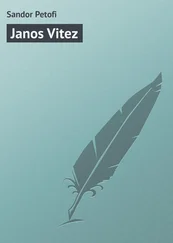“During those days, I was quite alone. And yet I knew that it was the moment when the time had come for everything to become clear and fall into place, you, me, everybody. Yes, that’s what I understood out on the hunt,” he says, lost in his memories and also answering a question he must often have asked himself.
“What did you understand?” asked Konrad.
“It was a beautiful hunt,” says the General, his voice almost warm, as if he is reliving the particulars of a favorite memory. favorite memory.
“The last big hunt in this forest. There were huntsmen then, real huntsmen … perhaps they still exist today, I don’t know. That was the last time I went hunting in my forest. Since that time only people who come are Sunday hunters, guests, who are received and taken care of by the steward and play around with their guns among the trees. The real hunt was something else entirely. You won’t be able to understand that, because you were never a huntsman. It was just another duty, one of those professional duties appropriate to your rank, like riding and attending social gatherings. You were a huntsman, but only in the way of someone bowing to social customs.
“When you were out hunting, there would be a scornful look on your face, and you always carried your gun carelessly, as if it were a walking stick. You are a stranger to this oddest of passions, the most secret of in a man’s life, that burns deep inside him like magma, deeper than any role he plays, or clothes he wears, refinements he learns. It’s the passion for killing. We are human beings, and it is part of our human condition to kill. It’s an imperative … we kill to protect, we kill to keep hold, we kill in revenge. You’re smiling in scorn … You were an artist, and these base, raw instincts had been refined out of your artist’s soul. Maybe you think you never killed a living creature.
Bu that is by no means certain.” His voice is stern and precise.
“This is the evening when there is no point in discussing anything but the essentials and the truth, because there will be no second such meeting, and maybe there are not many evenings and days left to either of us … I am sure there will never be another one with greater significance. Perhaps you remember I, too, was once in the Orient a long time ago; it was on my honeymoon with Krisztina. We traveled all through the Arabian lands, and in Baghdad we were the guests of an Arabian family. They are the most distinguished people, as you, after all your travels, certainly know for yourself. Their pride, their hauteur, their bearing, their fiery natures and their calm, their disciplined bodies and confident movements, their games, the flash in their eyes, all demonstrate a primeval sense of rank, not social rank but man’s first awakening in the chaos of creation to an understanding of his human dignity. “There is a theory that at the beginning of time, long before the formation of peoples and tribes and cultures, the human species came into being there, deep in the Arabian world. Perhaps that explains their pride, I don’t know. I’m not well-versed in these matters … but I do understand something about pride. And in the way one can sense, without any external evidence, that someone is of the same race and social rank, I sensed during those weeks in the Orient that the people there have a grandeur, including even the dirtiest camel driver. As I said, we were living with a local family, in a house that was like a palace; our ambassador had been kind enough to arrange the invitation. Those cool, white houses … do you know them? Each with its central courtyard, where the whole life of the family and the clan is conducted, so it is like a weekly market, a parliament, and a temple forecourt all rolled into one.
..the way they saunter, their eagerness to play that shows in all their movements. And that dignified, determined idleness, behind which their exuberance and passions lurk like snakes behind stones in the hot sun.
“One evening our hosts invited Arab guests in our honor. Until then, their hospitality had been more or less in the European style; the owner of the house was both a judge and a dealer in contraband, one of the wealthiest men in the city. The guest rooms had English furniture, the bathtub was made of solid silver. But on this particular evening we saw something quite other. The guests arrived after sundown, only men, grand gentlemen with their servants. In the middle of the courtyard the fire was already lit, burning with that acrid smoke that comes from camel dung. Everyone sat down around it in silence. Krisztina was the only woman present. A lamb was brought, a white lamb, and our host took his knife and killed it with a movement I shall never forget … a movement like that is not something one learns, it is an Oriental movement straight out of the time when the act of killing still had a symbolic and religious significance, when it denoted sacrifice. That was how Abraham lifted the knife over Isaac when he was preparing to sacrifice him, that was the movement in the ancient temples when the sacrifice was made at the altar before the idols or the image of the godhead, and that was the movement that struck John the Baptist’s head from his body …
it is utterly ancient. In the Orient it is innate to every man. Perhaps it is what first distinguished humans as a species, after the interval when they were part human, part animal … “According to current wisdom, being human began with the opposable thumb, which made it possible to pick up a weapon or a tool. But perhaps being human begins with the soul and not the thumb. I don’t know … The Arab slaughtered the lamb, and as he did so, this old man in his white burnous, which remained unspotted by blood, was like an oriental high priest performing the sacrifice. His eyes gleamed, for a moment he was young again, and all around him there was absolute silence. They sat around the fire, they watched the act of killing, the flash of the knife, the twitching of the lamb, the jet of blood, and their eyes gleamed also. And then I realized that these people are still intimately familiar with the act of killing, blood is something they know well, and the flash of the knife is as natural to them as the smile of a woman, or the rain. We understood-and I think Krisztina did, too, because at that moment she was seized with emotion, she blushed, then went white, breathed with difficulty, and turned her head away, as if she were witness to some passionate encounter-we understood that people in the East still retain their knowledge of the sacred symbolism of killing and its inner spiritual meaning. These dark, noble faces were all smiling, they pursed their lips and grinned in a kind of ecstasy as they watched, as if the killing were a warm, happy event, like an embrace. Curious, that in Hungarian our words for killing and embracing echo and heighten each other. 1
“Well, of course we are westerners,” he says in another voice, sounding suddenly professional. “Westerners, or at least immigrants who settled here. For us, killing is a question of law and morality, or medicine, at any rate a sanctioned or prohibited act that is very precisely delineated within our system of thought. We kill, too, but in a more complicated way; we kill according to the dictates and authorization of the law. We kill to protect high principles and important human values, we kill to preserve the social order. It cannot be any other way. We are Christians, we have a sense of guilt, we are the product of Western civilization. Our history, right up to the present, is filled with mass murder, but whenever we speak of killing, it is with eyes lowered and in tones of pious horror; we cannot do otherwise, it is our prescribed role. There is only the hunt,” he says, suddenly sounding almost happy.
“Even then, we observe rules that are both chivalrous and practical, we protect the game according to the demands of the situation in any particular area, but the hunt is still a sacrifice, a distorted residue of what can still be recognized as a ritual that once formed part of a most ancient religious act. It is not true that the huntsman kills for the prize. That has never been the case, not even in prehistoric times, when hunting was one of the few ways to obtain food. The hunt was always surrounded by religious tribal ritual. The good huntsman was always the leader of his tribe and also in some fashion a priest. Over the course of time, all that has naturally faded, but even in their faded form, the rituals are still with us. In my whole life I think I have loved nothing so much as the first light of dawn on the day of a hunt. You get up in darkness, you put on clothes quite different from those you wear every day, and clothes that have been selected for a purpose, in a lamplit room you eat a breakfast that is quite different from the usual breakfast: you fortify your heart with schnapps and e at a slice of cold meat with it. I loved the smell of hunting clothes; the felt was impregnated with scents of the forest, the leaves, the air and blood, because you had hung the birds you had shot from your belt, and their blood had dirtied the jacket. But is blood dirty? … I don’t believe so.
Читать дальше












